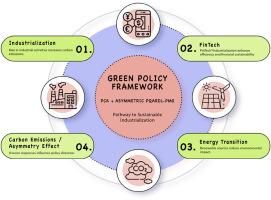Navigating the nexus of renewable energy, industrialization, financial technology, and carbon emissions: An in-depth analysis and policy framework
IF 12.5
1区 社会学
Q1 SOCIAL ISSUES
引用次数: 0
Abstract
The debate over decoupling industrialization from carbon emissions has a long empirical history. This study posits FinTech as a potential decoupler. Focusing on the interconnections between renewable energy, industrialization, FinTech, and carbon emissions, the research examines how these factors interact in the context of escalating global environmental challenges. To explore these dynamics, the study employs principal component analysis (PCA) alongside an asymmetric panel quantile autoregressive distributed lag model with a pooled mean group specification (A-QARDL-PMG). The moderating role of FinTech is explored as a potential decoupler between industrialization and deindustrialization in relation to carbon emissions. A large body of evidence across all quantiles indicates that financial technology has the potential to boost economic growth and reduce carbon emissions, primarily due to its facilitation of access to sustainable activities. The study emphasizes the significance of green industrialization initiatives while analyzing the impacts of industrialization and deindustrialization on emissions. It further investigates the moderating effect of financial technology on industrial emissions and offers relevant policy recommendations. In addition, the study explores economic complexity and emission reduction across various quantile levels, providing insights potentially useful for future endeavors. This research aims to comprehend the intricate relationship between these components to identify sustainable ways for economic growth rather than focusing solely on short-term solutions. Regulations pertaining to industry transitions, governance of financial technologies, and the promotion of renewable energy development are highlighted.

导航可再生能源、工业化、金融技术和碳排放之间的联系:深入分析和政策框架
关于工业化与碳排放脱钩的争论由来已久。这项研究假设金融科技是一个潜在的解耦器。该研究着眼于可再生能源、工业化、金融科技和碳排放之间的相互联系,探讨了这些因素在全球环境挑战不断升级的背景下如何相互作用。为了探索这些动态,该研究采用了主成分分析(PCA)以及具有混合平均群体规格(a - qardl - pmg)的非对称面板分位数自回归分布滞后模型。本文探讨了金融科技作为工业化和去工业化之间潜在的解耦器在碳排放方面的调节作用。所有分位数的大量证据表明,金融技术具有促进经济增长和减少碳排放的潜力,主要是因为它促进了可持续活动的开展。本研究在分析工业化和去工业化对排放影响的同时,强调了绿色工业化举措的重要性。进一步探讨金融科技对工业排放的调节作用,并提出相关政策建议。此外,该研究还探讨了经济复杂性和不同分位数水平的减排,为未来的努力提供了可能有用的见解。本研究旨在理解这些组成部分之间的复杂关系,以确定经济增长的可持续方式,而不是仅仅关注短期解决方案。强调了与行业转型、金融技术治理和促进可再生能源发展有关的法规。
本文章由计算机程序翻译,如有差异,请以英文原文为准。
求助全文
约1分钟内获得全文
求助全文
来源期刊

Technology in Society
Multiple-
CiteScore
17.90
自引率
14.10%
发文量
316
审稿时长
60 days
期刊介绍:
Technology in Society is a global journal dedicated to fostering discourse at the crossroads of technological change and the social, economic, business, and philosophical transformation of our world. The journal aims to provide scholarly contributions that empower decision-makers to thoughtfully and intentionally navigate the decisions shaping this dynamic landscape. A common thread across these fields is the role of technology in society, influencing economic, political, and cultural dynamics. Scholarly work in Technology in Society delves into the social forces shaping technological decisions and the societal choices regarding technology use. This encompasses scholarly and theoretical approaches (history and philosophy of science and technology, technology forecasting, economic growth, and policy, ethics), applied approaches (business innovation, technology management, legal and engineering), and developmental perspectives (technology transfer, technology assessment, and economic development). Detailed information about the journal's aims and scope on specific topics can be found in Technology in Society Briefings, accessible via our Special Issues and Article Collections.
 求助内容:
求助内容: 应助结果提醒方式:
应助结果提醒方式:


